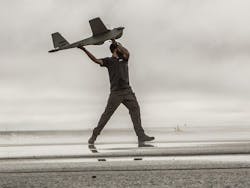The Federal Aviation Administration (FAA) has granted permission to BP and UAV manufacturer AeroVironment to fly the first commercial UAV to fly over land for the purposes of aerial surveys over Alaska’s North Slope.
If you’ve been following the FAA-UAV storyline over the past few months like I have, you know that this is big news. If you haven’t, here is a brief recap:
March: UAVs are officially deemed legal (or at least, not illegal). The FAA filed a case against 29-year-old Raphael Pirker, who used a commercial UAV to film a commercial at the University of Virginia. He and his lawyer fought the case, saying that the FAA has never officially regulated model aircraft and that its entire basis for making them illegal, a 2007 policy notice, was not legally binding. A US federal judge dismissed the case after it was deemed the FAA has never undertaken the required public notices necessary to make it an official law. The FAA responded, saying it would appeal the decision of the National Transportation Safety Board (NTSB) administrative law judge to the full NTSB Safety Board because it could "impact the safe operation of the national airspace system and the safety of people and property on the ground."
Shortly thereafter, commercial UAVs, still unapproved by the FAA, began flying or launched plans to do so for various applications.
May: The FAA announces that it is now considering a streamlined approval process for flights of small UAVs for filmmaking, utilities inspection, agriculture, and other low-risk operations. The first official regulation for allowing commercial UAV flights is at least a year away, but the approval of a process for limited applications using smaller UAVs could speed up the process for many looking to take to the skies. Michael Toscano, president and CEO of the Association for Unmanned Vehicle Systems International, said the idea was applauded by his organization, which estimates that the unmanned aircraft industry will generate 100,000 jobs and $82 billion in economic impact once the FAA begins approving commercial operations.
Page 1 | Page 2
About the Author

James Carroll
Former VSD Editor James Carroll joined the team 2013. Carroll covered machine vision and imaging from numerous angles, including application stories, industry news, market updates, and new products. In addition to writing and editing articles, Carroll managed the Innovators Awards program and webcasts.

